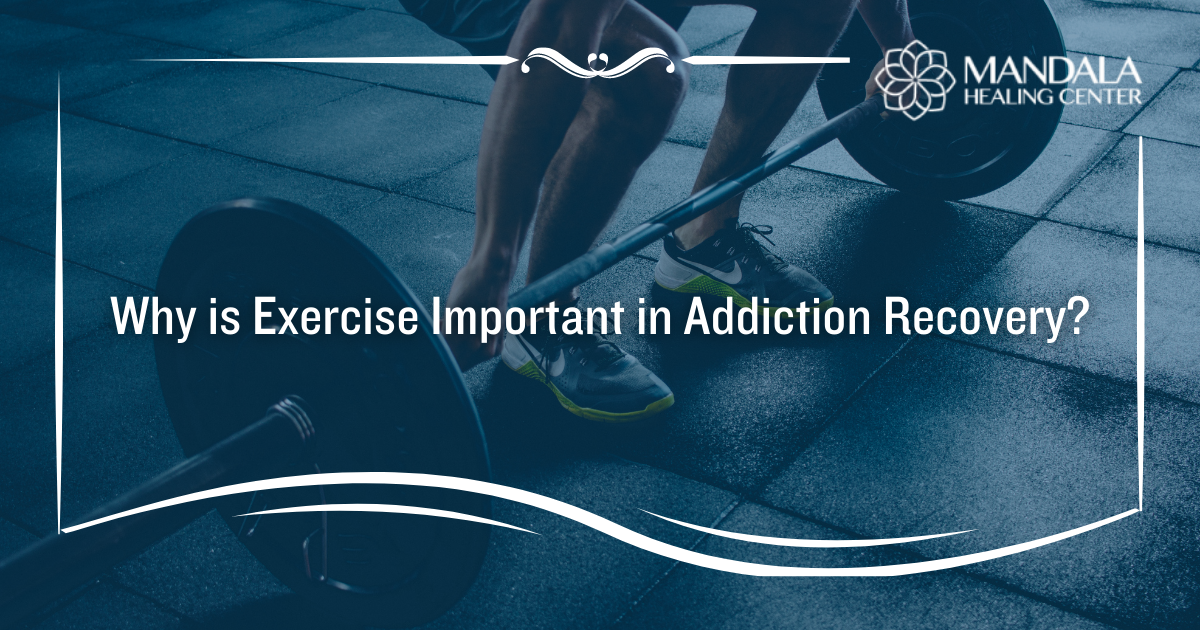Recovery from addiction takes commitment and hard work, but it also requires that people get whole-person treatment. It is not enough to treat only the physical aspects of addiction–treatment must include care for your mind, spirit, and community, too.
Many treatment programs incorporate holistic therapies into people’s treatment plans. Holistic practices like yoga and meditation, art and music, acupuncture, massage, and nutrition therapy can be used alongside evidence-based therapies to increase people’s health and sense of wellbeing during recovery.
Exercise can be an important holistic complement to an addiction treatment program. Exercise offers a range of important benefits to all people, and it can be an especially important and effective aspect of addiction recovery.
If you or a loved one needs addiction treatment or support during addiction recovery, please reach out to the staff at the Mandala Healing Center. We offer carefully-designed, adaptable treatment options that can support people at any stage of their journey. Because addiction is not a one-size-fits-all journey, our treatment options are designed to care for the whole person–body, mind, and spirit.
Physical Benefits of Exercise in Addiction Recovery
All people benefit from getting regular exercise. Regularly being active can help people maintain a healthy weight and body composition. It can improve flexibility, strength, and endurance.
In addiction recovery, exercise provides a lot of benefits for people’s physical and mental health. Some of the physical benefits include better sleep and lower blood pressure and heart rate. People who exercise regularly report less physical and mental stress and a better sense of overall well-being than those who are sedentary.
Some research suggests that exercise can help the brain make new nerve connections and that this may help heal some of the brain damage caused by prolonged substance abuse.[1] People who give up smoking during recovery also benefit from an increase in oxygen to the brain and muscles. They may also have an easier time avoiding the weight gain that can be common after giving up smoking.
In studies, people who exercise in addiction treatment programs have fewer cravings and more days of abstinence from substances than those who do not.[2] Exercise in addiction recovery is a powerful tool that can help people meet their goal of lifelong sobriety.
Mental Benefits of Exercise in Addiction Treatment
Exercise isn’t just good for your body–it’s also great for your mind. Exercise gives you a boost of endorphins. These feel-good brain chemicals can make you feel happier and less stressed and depressed.[3] In addition to reducing your physical tension, exercise can produce feelings of calm and relaxation in your mind, too.
One of the challenges of life in recovery is finding ways to fill your time and occupy your mind. Exercise gives people in recovery an outlet for their time and energy and is something new to focus on. Joining a community fitness group or gym can help make new friends and increase your healthy social circle.
People who exercise report having a better outlook on life. Incorporating movement and activity into your life in recovery may lead to increased self-esteem, a better self-image, and a feeling of accomplishment and pride.
How to Incorporate Exercise in Your Addiction Recovery Program
Many treatment centers offer exercise classes, outdoor recreation, or gym membership as part of their treatment programs. Even if you have never had an intentional exercise plan, you can incorporate movement into your daily routine during addiction treatment and continue after you complete rehab.
Being active does not require spending hours at the gym or on a treadmill. The best exercise is any movement that you enjoy. Not only will you reap the immediate mood boost of movement that makes you happy, but you’ll also be more likely to stay active.
People have different activities that make them feel good. It’s important to find one that you take pleasure in. Some ideas are:
- Hiking
- Walking–on your own, with a friend, or with a dog
- Yoga–online classes, community classes, or outdoors
- Swimming–laps in the pool or a natural body of water
- Weightlifting
- Crossfit
- Active chores–cleaning, yard work, hauling groceries
- Jogging or running
- Tennis, soccer, softball, or other team sports
Find the exercise that makes you happy and keep trying new activities to stay active. Work up to a goal of 150 minutes of moderate exercise per week to get the most benefits for your mind and body.
Learn More About the Benefits of Exercise During Addiction Treatment at Mandala Healing Center
If you or someone you love requires addiction treatment, you are not alone. Please reach out to the staff at the Mandala Healing Center to learn more about the supportive, holistic treatment options we offer.
We believe that anyone can recover from addiction and thrive if they have the right support and care. If you have been waiting to get the treatment you need, don’t put it off another day. Your new, healthy chapter can start today. Call now to speak to one of our caring admissions counselors.
References:












